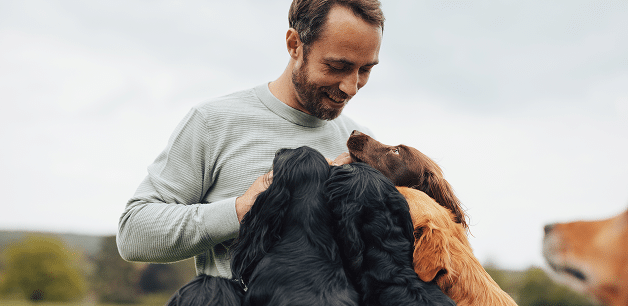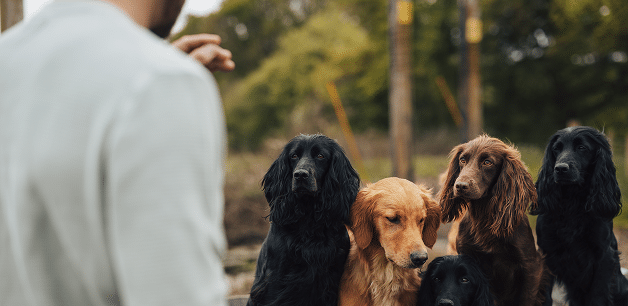My history with working cocker spaniels
If you know me, you’ll know I have a deep love for all dogs, but I must admit, the working cocker spaniel holds a special place in my heart. I’ve shared my life with many of them over the years, starting with my beloved Ella, each one unique, loyal and full of boundless energy. These spirited little companions have taught me more about patience, joy, and the outdoors than any book ever could.
So whether you’re welcoming a working cocker spaniel puppy into your home or simply curious about this extraordinary breed, here’s everything I’ve learnt – first-hand!

A brief introduction to the working Cocker Spaniel
The working cocker spaniel is a variation of the English cocker spaniel, originally bred as a gun dog to retrieve game across tough terrain. Unlike their show-line cousins, working cockers are leaner, more agile, and bred for stamina and drive. They’re intelligent, endlessly enthusiastic, and carry that trademark “eagerness to please” that makes them so trainable – if you can keep up!
I often get asked: Are working cocker spaniels good family pets? Absolutely. While they were bred as working dogs, their affectionate nature and boundless loyalty make them wonderful companions. Just be ready to match their energy levels with regular mental and physical stimulation.
Working Cocker Spaniel Personality
There’s something undeniably captivating about a working cocker spaniel’s personality. They’re alert, affectionate, and incredibly driven – especially when it comes to sniffing out treats or chasing a ball. But don’t let that high energy fool you. They’re just as happy curled up next to you after a day of exploring.
These dogs thrive with structure, routine, and a job to do. Whether that’s training sessions in the garden or joining you on long countryside walks.
How Much Exercise Does a Working Cocker Spaniel Need?
Working cocker spaniels are built for endurance. If you’re wondering how much exercise do working cocker spaniels need? The answer is, quite a lot. I recommend at least 1–2 hours a day of varied activity. That could be off-lead romps in a safe space, scent work, swimming, or structured playtime.
When they’re not exercised properly, working cockers can become restless and even destructive. But in my experience, giving them a good run and something to focus on ensures they’re calm, content and utterly loyal.

Training a Working Cocker Spaniel
Training a working cocker spaniel is a joy, but it requires consistency and a good dose of patience. Their eagerness to please makes them highly responsive to positive reinforcement, especially when you’ve got something tasty in hand (James & Ella’s Freeze-Dried Treats are a game-changer here).
If you’re asking how to train a working cocker spaniel, my advice is to keep sessions short, engaging, and fun. Start early with your working cocker spaniel puppy – basic obedience, recall and impulse control are the foundations of a well-balanced adult dog.
Working Cocker Spaniel Grooming
Do working cocker spaniels need grooming? Yes, and regularly. Their soft, silky coats are prone to matting, especially around the ears, legs, and tail. Regular brushing (at least two to three times a week) will keep things manageable.
Wondering how to groom a working cocker spaniel? My tried and tested tool of choice is my trusted Tangle Teezer! Pay attention to matted areas, and don’t forget those long, floppy ears, too.
Do working cocker spaniels shed? They do, but it’s manageable with routine brushing, especially during the spring and autumn when they tend to drop more.
Do working cocker spaniels have a double coat? Some lines do, especially those bred for harsh weather. If you’re noticing extra fluff, chances are your dog has a double coat.
And when do working cocker spaniels get their full coat? Most will develop their adult coat by 6–12 months, but it can continue to fill out until around 18 months.

Nutrition: Feeding Your Working Cocker Spaniel
One of the most important things I’ve learnt over the years is how profoundly diet impacts a dog’s health, behaviour and happiness. That’s part of the reason why I founded James & Ella.
So what’s the best food for a working cocker spaniel? I believe it starts with quality, biologically appropriate nutrition. For adults, our Freeze-Dried Raw range is packed with ethically-sourced meat, fruit, veg, superfoods and absolutely no nasties – providing your dog with sustained energy for long days out and calm focus when it matters.
For puppies, our Kibble + Raw Puppy food supports healthy growth and brain development from a young age – when premium nutrition really matters.
Also, our Air-dried treats and Freeze-Dried Treats and Toppers are brilliant for enrichment, training and encouraging fussy eaters – especially when paired with a little warm water or bone broth.

Working Cocker Spaniel Health Issues
Like all dog breeds, working cocker spaniels have some health conditions to be aware of. Common working cocker spaniel health issues include:
Ear infections
Hip dysplasia and arthritis
Progressive retinal atrophy
Autoimmune conditions
Skin sensitivities
Always choose health-tested working cocker spaniels from reputable breeders and make sure your vet is familiar with the breed’s needs. A nutrient-dense, healthy diet and regular exercise can go a long way toward prevention.
Coat After neutering and Ideal Weight
After spaying or neutering, you may notice changes in your dog’s coat texture – often fluffier or more difficult to manage. It’s a common occurrence and can be helped with extra brushing and coat care.
The ideal weight for a working cocker spaniel typically falls between 12–16kg, depending on size, sex and activity levels. Keep an eye on their waist and ribs – feel, don’t guess, and if you’re unsure, check out my blog all about how to body score your dog correctly and manage their weight.
Cost of Working Cocker Spaniel Puppies
So how much does a working cocker spaniel cost? In the UK, expect to pay anywhere from £800 to £1,800 for a health-tested puppy from a reputable breeder. The English working cocker spaniel cost may be slightly higher for dogs with strong field trial lines.
Keep in mind the ongoing costs: food, grooming, training, insurance and the occasional muddy car seat.
Looking forward to a new four-legged addition to your family soon? Make sure to check out my blog all about welcoming a new puppy into your home!

In Summary: Is the Working Cocker Spaniel Right for You?
If you’re looking for a loyal companion with intelligence, energy and charm, the working cocker spaniel is a truly remarkable breed. They’ve been at my side through thick and thin – on adventures and quiet evenings at home.
But they’re not for everyone. They require time, patience, and a willingness to embrace the outdoors, rain or shine. With the right balance of training, grooming, exercise and nutrition, though, they’re one of the most rewarding companions you could ask for.
And if you’re already lucky enough to live with one, give them a scratch behind the ears from me – and maybe a treat or two!
Until next time,
James x
